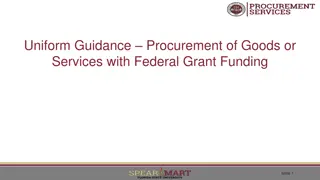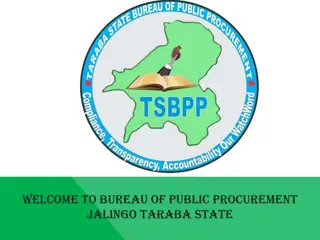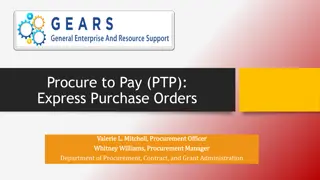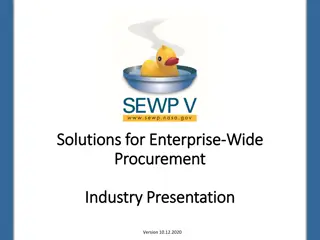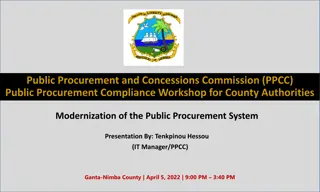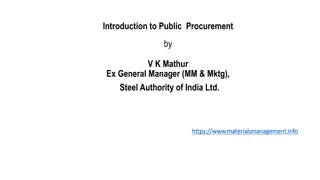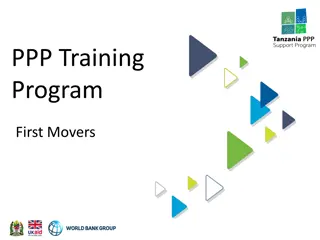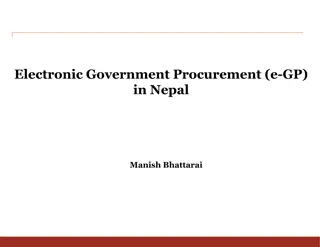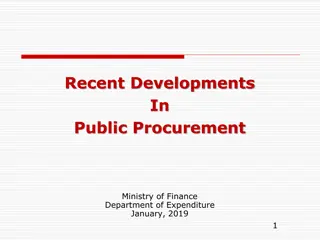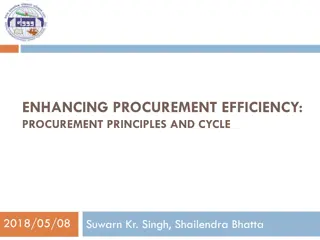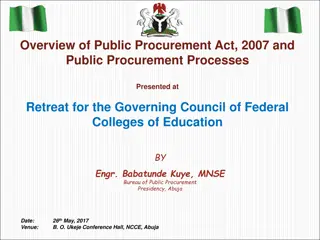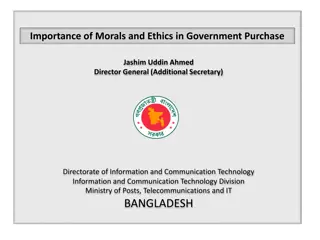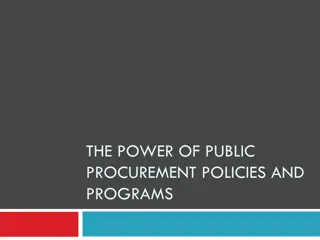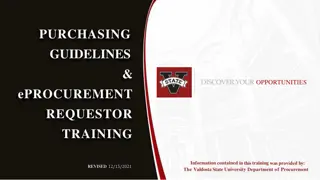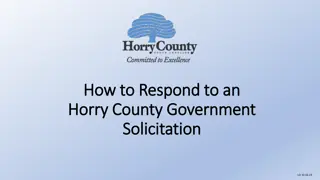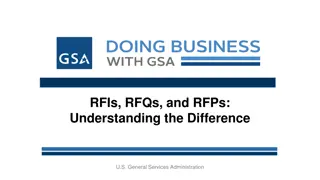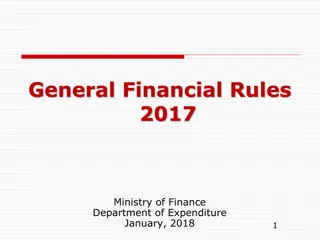Government Procurement Processes: Solicitations, RFPs, RFQs, and More
Delve into the world of government procurement as we explore the processes of soliciting bids, requests for proposals, and requests for quotes. Learn about the regulations, exceptions, and requirements involved in doing business with the largest buyer of goods and services in the world - the government.
Download Presentation

Please find below an Image/Link to download the presentation.
The content on the website is provided AS IS for your information and personal use only. It may not be sold, licensed, or shared on other websites without obtaining consent from the author. Download presentation by click this link. If you encounter any issues during the download, it is possible that the publisher has removed the file from their server.
E N D
Presentation Transcript
Litigating With Your Government Customer: When, Where and Why P R E S E N T E D B Y B r a d E n g l i s h , N i ch o l a s G r e e r a n d M a r y A n n H a n k e D A T E D e ce m b e r 1 , 2 0 2 1 2
How does the Government do business? Largest buyer of goods and services in the world Competition is mandated under Competition in Contracting Act; generally, must be full and open competition An executive agency in conducting a procurement for property or services shall (1) obtain full and open competition through the use of competitive procedures in accordance with the requirements of this division and the Federal Acquisition Regulation. 41 U.S.C. 3301(a)(1) Exceptions: Size and status set aside contracts Examples: Woman owned small businesses, service disabled veteran owned small businesses 3
Solicitations, Requests for Proposals and Requests for Quotes 4
What is a Solicitation/RFP/RFQ? Necessary for government acquisition of goods or services Issued by procuring agency Federal Acquisition Regulation ( FAR ) 48 C.F.R. 2.101 any request to submit offers or quotations to the Government. Solicitations under sealed bid procedures are called "invitations for bids." Solicitations under negotiated procedures are called "requests for proposals." Solicitations under simplified acquisition procedures may require submission of either a quotation or an offer. Requests for Quotes ( RFQ ) differ from regular solicitations Response, or quotation, does not constitute an offer to the government instead, government will take quotation and issue order to contractor based on quotation 5
Solicitation/RFP/RFQ Section L Includes instructions, conditions and notices Provides information regarding how proposal should be drafted, including page limit, font specifications, and required volumes Also details how proposal should be submitted and when Late is late rule - Any proposal, modification, or revision, received at the Government office designated in the solicitation after the exact time specified for receipt of offers is late and will not be considered unless it is received before award is made, the Contracting Officer determines that accepting the late offer would not unduly delay the acquisition[.] 48 C.F.R. 52.215-1 6
Solicitation/RFP/RFQ Section M Includes evaluation factors and criteria Usually includes definitions for adjectival ratings and confidence ratings 10
Debriefing The Agency must [F]urnish the basis for the selection decision and contract award and must include: significant weak or deficient factors in offeror soffer; overall evaluated cost and technical rating of the awarded offer and protestor; overall ranking of all offerors; summary of rationale for the award; the make and model of item being accepted for award (for commercial item); reasonable responses to relevant questions posed by the debriefed offeror regarding agency s source selection decision; and opportunity for offeror to submit additional questions within two days of receiving debriefing. 41 U.S.C. 3704(c) (Civilian); 10 U.S.C. 3304(c) (DoD) Note: additional questions only allowed in enhanced debriefing provided during DoD procurement. 16
Debriefing 17
Bid Protests 18
What is a Bid Protest? Competition in Contracting Act, 31 U.S.C. 3551(1) A written objection by an interested party to any of the following: (A) A solicitation or other request by a Federal agency for offers for a contract for the procurement of property or services. (B) The cancellation of such a solicitation or other request. (C) An award or proposed award of such a contract. Tucker Act, 28 USC 1491(b)(1) Action by an interested party objecting to a solicitation by a Federal agency for bids or proposals for a proposed contract or to a proposed award or the award of a contract or any alleged violation of statute or regulation in connection with a procurement or a proposed procurement. 19
What is a Bid Protest? Challenge to a government procurement Pre-Award Challenge brought prior to government making award May be brought prior to solicitation s due date (Blue and Gold) Necessary when challenging terms of solicitation, such as ambiguity Post Award Challenge brought after government has made award Offeror challenges award to other offeror Forum: Agency, Government Accountability Office ( GAO ) or Court of Federal Claims ( CoFC ) 20
What is a Bid Protest? Federal Acquisition Streamlining Act of 1994 ( FASA ) bans protests on task orders 41 U.S.C. 4106(f) (Civilian); 10 U.S.C. 3406(f) (DoD) Task Order: A contract for services that (A) does not procure or specify a firm quantity of services (other than a minimum or maximum quantity); and (B) provides for the issuance of orders for the performance of tasks during the period of the contract. 41 U.S.C. 4101(2); 10 U.S.C. 3401(2). Exceptions: $10 million for civilian agencies $25 million for DoD If FASA applies, GAO is the only option. If below jurisdictional thresholds, no protest. 21
Standing Must be an interested party GAO: [A]n actual or prospective bidder or offeror whose direct economic interest would be affected by the award of the contract or by failure to award the contract. 31 U.S.C.A. 3551(2)(A). CoFC: [A]ctual or prospective bidders or offerors whose direct economic interest would be affected by the award of the contract or by failure to award the contract. Rex Serv. Corp. v. United States, 448 F.3d 1305, 1307 (Fed. Cir. 2006) 22
Prejudice Must be able to show Protestor had a substantial chance at receiving award but for Agency s actions GAO: Our Office will not sustain a protest unless the protester demonstrates a reasonable possibility that it was prejudiced by the agency's actions; that is, unless the protester demonstrates that, but for the agency's actions, it would have had a substantial chance of receiving award. Chardonnay Dialysis, LLC, B-420910 (Oct. 27, 2022). CoFC: Protestor must be able to show the Agency s actions prejudiced it and that, but for the Agency s conduct, protestor would have had a substantial chance at receiving award. Bannum, Inc. v. United States, 404 F.3d 1346, 1353 (Fed. Cir. 2005). 23
Agency Level Protests Protest lodged directly with Contracting Officer Provides government chance to fix issues in a litigation posture, preserves challenges; stays procurement Least likely to get relief Contracting Officer must suspend performance if protest is raised within: 10 days after award or 5 days from Agency s debriefing Can avoid suspension if Agency deems urgent and compelling needs Must include detailed statement of legal and factual grounds of protest and requested relief Can appeal decision to either GAO or Court of Federal Claims, subject to FASA bar 24
GAO GAO must issue decision within 100 days of protest filing Standard of Review GAO examines the record to determine whether the agency's judgment was reasonable, and in accordance with solicitation criteria and applicable procurement statutes and regulations. Patriot Def. Grp., LLC, B-418720.3, 2020 CPD P 265 (Aug. 5, 2020). CICA stay applies if protest is filed within 10 days from date of award, or when basis of protest is known or should have been known; 5 days from required debriefing Protest must include detailed statement of legal and factual grounds for protest Letter format Agency must file Agency Report within 30 days of receiving notice of protest from GAO 5 day Letter Agency Report will include proposals, evaluation documents, contracting officer statement and memorandum of law Parties have 10 days to file Comments on Agency Report 25
Court of Federal Claims Protest must be filed either prior to deadline to submit offers (Pre- Award) or any time after award is made (Post-Award) Pre-Award Timeliness: [A] party who has the opportunity to object to the terms of a government solicitation containing a patent error and fails to do so prior to the close of the bidding process waives its ability to raise the same objection subsequently in a bid protest action in the Court of Federal Claims. Blue & Gold Fleet, L.P. v. United States, 492 F.3d 1308, 1313 (Fed. Cir. 2007) The Federal Circuit has held that a timely Agency protest regarding language of a solicitation preserves the action Harmonia Holdings Group, LLC. v. United States, 20 F.4th 759 (Fed. Cir. 2021.) The Federal Circuit has further held that the government s awareness of a potential legal or regulatory violation qualifies as a challenge to the procurement for standing purposes. SEKRI, Inc. v. United States, 34 F.4th 1063, 1073 (Fed. Cir. 2022) 26
Court of Federal Claims There is no deadline to file Post-Award Bid Protest There is also no stay of performance must file Motion for Preliminary Injunction to prevent performance during pendency of protest Protestor files normal complaint that adheres to Twombly/Iqbal pleading standards; the Rules of the Court of Federal Claims largely track the Federal Rules of Civil Procedure Government files Administrative Record Includes solicitation documents, subject proposals, evaluation documents Protester will then file Motion for Judgment on Administrative Record (RCFC 52.1) Defendant (Government) and Intervenor (Awardee) will file Cross Motions for Judgment on Administrative Record Parties will then have oral argument 27
Court of Federal Claims Court uses CM/ECF, majority of filings are under seal to protect confidential/proprietary information Standard of Review [A] reviewing court shall set aside the agency action if it is arbitrary, capricious, an abuse of discretion, or otherwise not in accordance with law. Banknote Corp. of Am. v. United States, 365 F.3d 1345, 1350-51 (Fed. Cir. 2004). [A] procurement decision may be set aside if it lacked a rational basis or if the agency's decision-making involved a clear and prejudicial violation of statute, regulation or procedure. Chenega Healthcare Services, LLC v. United States, 141 Fed. Cl. 254 (2019) Court of Appeals for Federal Circuit has jurisdiction over appeals Reviews CoFC decisions de novo using same standard of review Factual findings are reviewed for clear error 28
Claims 29
Claims Differ from protests claims are disputes that arise after contract award and occur between a contractor and the government Jurisdiction Tucker Act must be brought in Court of Federal Claims The United States Court of Federal Claims shall have jurisdiction to render judgment upon any claim against the United States founded either upon the Constitution. . .or upon any express or implied contract with the United States[.] 28 U.S.C.A. 1491(a)(1) Breach of contract claim governed by Contract Disputes Act 41 U.S.C. 7102(a) 30
Claims Most government contracts contain a standard disputes clause 48 C.F.R. 53.233-1 Claim, as used in this clause, means a written demand or written assertion by one of the contracting parties seeking, as a matter of right, the payment of money in a sum certain, the adjustment or interpretation of contract terms, or other relief arising under or relating to this contract. 48 C.F.R. 53.233-1(c) This clause is incorporated into contracts and directs contractors to 41 U.S.C. Chapter 71 for claims and dispute procedures 31
Claims Contract changes Breach of contract Past performance Terminations Defective specifications 32
Claims Contract Changes Authority to Change Methods Unilateral Bilateral Analyzing change Is additional work required? Is additional work in or outside scope of contract? In scope changes clause Out of scope justification & approval or issue new contract Effect of change? Will change increase time or money contractor must spend to perform Constructive change? 33
Claims Elements of changes Government action/inaction caused the change Contractor did not perform voluntarily Increase in cost or time of performance Order Theory/Fault Theory CO must be notified and can adopt, reject and disclaim, or adopt the conduct but deny the change exists 34
Claims Request for Equitable Adjustment ( REA ) Contractor officially asking Agency to adjust contract price to include additional costs based on change in contract requirements Attempt to work out with CO first REA is viewed as less adversarial, however delays timeline if denied 35
Claims Submitting a claim 41 U.S.C. 7103 Written demand Must be sent to CO first and must seek final decision Elements of proper claim, sought as a matter of right Sum certain Adjustment or interpretation of contract terms Other relief Submitted to CO for final decision Must be certified if claim is over $100k Must be decided within 60 days Government can extend deadline to respond, usually once and no more than 60 days; can result in deemed denial Final decision can be appealed to two forums Ensure written demand includes ALL claims and requested relief 36
Litigating Claims Boards of Contract Appeals Civilian Board of Contract Appeals (CBCA) Armed Services Board of Contract Appeals (ASBCA) Appeal must be brought within 90 days of final decision by CO Streamlined proceedings, limited discovery Government represented by Agency counsel Presumptive trial location where contractor resides Presume that entitlement and quantum are tried separately Very consistent, rigidly applied precedent Look to file here if law favors your side on claim Standard of Review - 41 U.S.C. 7104 Can appeal decision to Court of Appeals for Federal Circuit 37
Litigating Claims Court of Federal Claims Must be brought within 12 months of final decision Proceeds like standard federal court case Government represented by DOJ s Commercial Litigation Branch, National Courts Section Presumptive trial location likely in DC at National Courts Building, travel will be necessary Presumption that entitlement and quantum are tried together Precedent is non-binding; factions among judges Can be more equitable Appeals brought to Court of Appeals for Federal Circuit 38
Litigating Claims Damages Special rules about damages use an expert! Actual Cost Specific costs, segregate and allocate most favored Total Cost Jury verdict method strongly disfavored Modified Total Cost Can be accepted in some instances 39
Questions? 40
Contact Info Brad English BEnglish@maynardcooper.com Nicholas Greer NGreer@maynardcooper.com Mary Ann Hanke MHanke@maynardcooper.com 41













